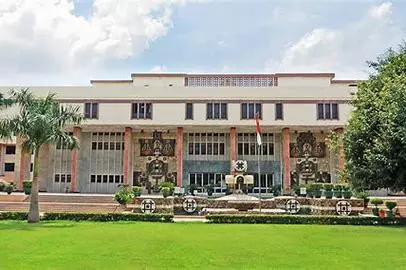- Home
- /
- High Courts
- /
- Delhi High Court
- /
- Familial Relationship Between...
Familial Relationship Between Prosecutrix And Accused Doesn't Negate Possibility Of 'Promise Of Marriage': Delhi HC Refuses To Quash Rape FIR
Sanjana Dadmi
3 Feb 2025 4:40 PM IST
While refusing to quash an FIR under Section 376 IPC for false promise of marriage, the Delhi High Court observed that the nature of the relationship between the parties is a crucial factor in determining whether there was any promise of marriage and whether the consent was vitiated by a misconception of fact. Justice Chandra Dhari Singh was considering the petitioner's plea to quash FIR...
While refusing to quash an FIR under Section 376 IPC for false promise of marriage, the Delhi High Court observed that the nature of the relationship between the parties is a crucial factor in determining whether there was any promise of marriage and whether the consent was vitiated by a misconception of fact.
Justice Chandra Dhari Singh was considering the petitioner's plea to quash FIR under Section 376 IPC lodged by his distant relative/prosecutrix.
As per the FIR, the petitioner and prosecutrix share a distant familial relation. It is alleged that the petitioner promised to marry the prosecutrix on various occasions and that she gave her consent to engage in physical relations with him based on such assurances.
It is stated that in November 2022 on the pretext of seeking familial approval for the marriage, the petitioner dropped the prosecutrix at her sister's house and later changed his phone number and avoided her calls, messages and emails. The prosecutrix thus lodged an FIR in February 2023.
The petitioner contended that as he and the prosecutrix were distant relatives, it was a matter of common understanding that a marriage between such relatives is legally impossible. The petitioner thus denied making any promise of marriage to the prosecutrix in view of this familial relation.
On the contrary, the prosecutrix argued that the petitioner did not fall within the prohibited degrees of relationship under the Hindu law or Sapinda relations. The prosecutrix contended that as she does not have a direct relationship with the petitioner, the marriage between them would not have been rendered impossible.
The Court referred to Pramod Suryabhan Pawar v. State of Maharashtra (2019), where the Supreme Court observed that the court must evaluate whether the accused harboured an honest intention to marry at the time of making the promise and whether the false promise has a direct nexus to the woman's decision to engage in the sexual act.
The Court observed that the nature of the relationship between the parties is a crucial factor in determining whether any promise of marriage was made. Nonetheless, it stated that while the petitioner's contention that the marriage between them was impossible may be relevant, it does not conclusively negate the possibility of an implied or explicit promise of marriage.
“The nature of the relationship between the parties is a crucial factor in determining whether any promise of marriage was made and whether the respondent's consent was vitiated by a misconception of fact. The petitioner's assertion that marriage between them was impossible may hold relevance, but it does not conclusively negate the possibility of an implied or explicit promise of marriage. It is also pertinent to note that the petitioner, being a major and of sound mind, was fully aware of the familial relationship between him and the respondent, and yet he proceeded to engage in physical relation with her. This conscious decision raises questions regarding the petitioner's intent and understanding of the consequences of his actions.”
It noted that the petitioner's decision to engage in physical relations with the respondent despite being aware of the familial relationship between him raised questions about his intent.
The petitioner also contended that there was a delay in lodging the FIR of almost four years. He argued that while the alleged incidents date back to 2019, the FIR was filed in February 2023 and that it casts serious doubt on the veracity of the allegations.
The Court observed that a delay in lodging an FIR, especially in cases involving allegations of sexual offenses cannot automatically render the allegations false.
Here, the Court noted that the prosecutrix explained that the delay was “influenced by her belief in the sincerity of their 12-year relationship and her hope that the petitioner would return.” It noted that when she discovered that the petitioner was planning to marry another woman, she lodged the FIR.
The Court thus was of the view that the prosecutrix provided convincing explanation for the delay in filing of her complaint. It remarked, “This explanation is plausible and warrants careful consideration during trial. The delay, under these circumstances, cannot serve as a ground to dismiss the allegations at this stage. Each case must be evaluated on its own merits to ensure that justice is not undermined by procedural technicalities.”
In view of the above, the Court opined that the allegations disclose a prima facie case against the petitioner under Section 376 IPC, warranting trial.
It thus refused to quash the FIR and dismissed the petition.
Case title: Divyansh Bajpai vs. State (Govt. Of NCT Of Delhi) And Anr
Citation: 2025 LiveLaw (Del) 125
Click Here To Read/Download Order



